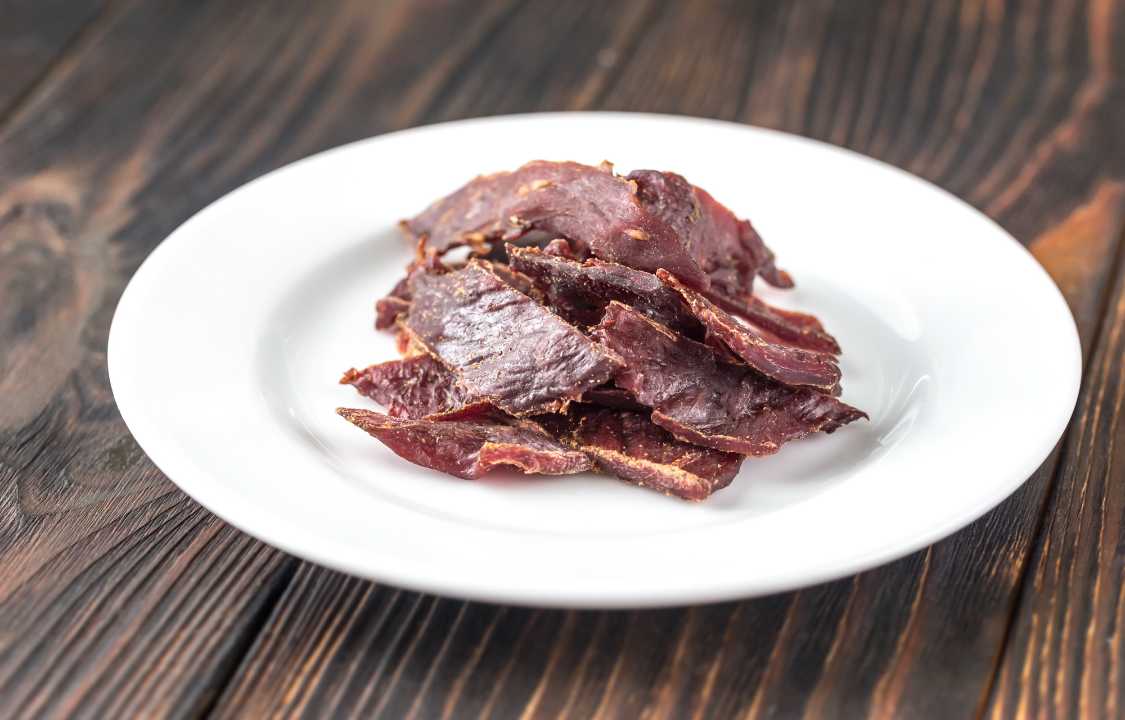Health Benefits, Health Care
Health Benefits of Beef Jerky
Beef jerky is an easy, portable source of protein but can also have a high sodium content.
Exploring the Nutritional Landscape of Beef Jerky
In the realm of portable snacks, beef jerky has emerged as a popular choice, boasting convenience, high protein content, and essential minerals like zinc and iron. However, delving into the intricacies of its nutritional profile reveals a mixed bag of benefits and potential drawbacks. As the paleo and keto diets, along with a heightened focus on protein intake, continue to influence dietary trends, the popularity of beef jerky has surged. No longer limited to a handful of well-known brands, this dried meat delicacy has expanded its reach to encompass a wide array of options, from gas stations to health food stores, catering to diverse preferences and lifestyles.
Understanding the Composition and Crafting of Beef Jerky
At its core, beef jerky consists of lean strips of dried meat, often accentuated with a dash of salt during the drying process to stave off spoilage. This preservation technique, though time-honored, brings with it certain considerations for health-conscious consumers. The surge in popularity of paleo and keto diets, which emphasize protein consumption, has significantly contributed to beef jerky’s increasing appeal. Amid this dietary landscape, the category has witnessed a remarkable evolution, transitioning from a niche market to a staple available in an array of outlets, including convenience stores, health food emporiums, and even farmer’s markets.
Unveiling the Nutritional Treasure Trove
Beef jerky serves as a convenient trove of essential nutrients, including protein, zinc, and iron, catering to those in pursuit of a swift, on-the-go snack option. While these nutrients play pivotal roles in various bodily functions, it’s crucial to strike a balance between the benefits and potential drawbacks of incorporating beef jerky into one’s dietary regimen.
A Protein Powerhouse
One of the standout attributes of beef jerky lies in its protein content, making it a veritable powerhouse of this essential macronutrient. Protein, the cornerstone of cellular repair and growth, plays a pivotal role in maintaining healthy bones, muscles, and skin. Unlike carbohydrates and fats, the body does not store protein, necessitating a consistent intake to meet daily requirements. The recommended protein intake varies based on factors such as age, sex, weight, and activity level, with experts suggesting a range of 10% to 35% of total caloric intake. For instance, a person consuming 2,000 calories daily may aim for around 100 grams of protein. Notably, a mere one-ounce serving of beef jerky contributes significantly towards achieving this protein goal.
Fostering a Robust Immune System
The nutritional advantages of beef jerky extend beyond its protein content, encompassing essential minerals like zinc that play a crucial role in supporting immune system function. With nearly one-quarter of the recommended daily zinc intake packed into a one-ounce serving of beef jerky, the potency of this immune-supporting mineral comes to the forefront. Furthermore, the body’s absorption of zinc from animal sources, such as beef jerky, is more efficient compared to plant-based alternatives. However, the broader context of maintaining a diverse, balanced diet cannot be understated in bolstering immune system resilience.
Empowering with Iron
The research underscores another key facet of beef jerky: its role as a rich source of heme iron. This form of iron is known for its enhanced bioavailability, facilitating the transport of oxygen to various bodily tissues. Considering the prevalence of iron deficiency, particularly among women, the accessibility of heme iron through beef jerky offers a valuable means of combating such deficiencies and fortifying overall health.
Navigating the Nutritional Terrain
The nutritional content of beef jerky can exhibit variations across different brands. As a general guideline, a one-ounce serving of beef jerky may provide the following nutrients:
- Calories: 116
- Fat: 7.26g
- Sodium: 505mg
- Carbohydrates: 3.12g
- Fiber: 0.51g
- Added sugars: 2.55g
- Protein: 9.41g
Emerging on the Horizon: Potential Drawbacks
While beef jerky undoubtedly boasts an array of nutritional benefits, its consumption also warrants careful consideration due to certain potential drawbacks. High sodium content is a characteristic hallmark of beef jerky, with a single serving contributing approximately 20% of the recommended daily sodium intake for adults. The broader context reveals that a significant portion of the U.S. population exceeds recommended sodium levels, a trend that could lead to water retention, bloating, and even weight gain over time. Moreover, excessive sodium intake is associated with health conditions ranging from an enlarged heart to high blood pressure, osteoporosis, and kidney stones.
A Complex Relationship with Health
It’s worth noting that beef jerky falls within the category of processed red meat, which has garnered attention for its potential links to health complications, including type 2 diabetes, cancer, and cardiovascular disease (CVD) risk. The correlation between processed red meat consumption and such health risks has prompted discussions about the potential benefits of replacing red meat with plant-based protein sources. For individuals seeking to reduce their red meat intake, alternatives like mushroom jerky, dried jackfruit, or coconut-based jerky provide enticing options that mimic both texture and flavor profiles.
Parsing the Ingredients and Making Mindful Choices
When evaluating packaged foods like beef jerky, scrutinizing the ingredient list is of paramount importance. Certain brands may incorporate common allergens, such as soy or barley malt extract (a gluten source). Additionally, many beef jerky products contain preservatives like sodium nitrite, which have been associated with heightened risks of arterial narrowing and CVD. Opting for simpler ingredient profiles, coupled with a preference for grass-fed and certified organic options, can align with health-conscious choices.
Embracing a Balanced Approach
In essence, the allure of beef jerky’s protein and nutrient density is balanced by the need for moderation and a holistic dietary outlook. As with any dietary choice, balance, and mindfulness remain integral. While beef jerky’s appeal lies in its convenience and nutritional attributes, a prudent approach to its consumption, considering both its benefits and potential risks, can pave the way for a harmonious relationship with this portable snack.

